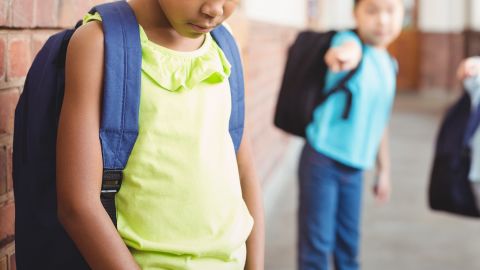There’s a crisis of bullying in US schools, and the solution is learning what to do before it happens.
One in 5 students report being bullied, according to data from the National Center for Educational Statistics. The US government website StopBullying.gov defines bullying behavior as an imbalance of power between perpetrator and victim, and repeated (or potential for repeated) incidents.
Prevention is at the heart of resolving bullying instead of waiting to respond once a more violent episode occurs or once many incidents escalate to a tragedy. StopBullying.gov offers resources to schools on educating students about bullying as well as techniques for keeping lines of communication open between students and staff. But parents can play a key role in this effort.
“We know that victims of bullying can experience negative impacts across all domains of their lives,” said Amanda McGough, a clinical psychologist who works with teenagers and adults and also sits on the American Foundation for Suicide Prevention as the North Carolina chapter president.
“It infringes upon their mental, emotional, physical, social and academic functioning. This may look like low self-esteem, depression, isolation, physical complaints like headaches or stomachaches, or avoiding going to school.”

Bullying can reach into children’s lives more than ever before. “The integration of social media in adolescents’ lives further exacerbates the impacts of bullying,” Nikki Pagano, a licensed clinical social worker in Charlotte, North Carolina, said via email.
“Before social media, there might have been an unpleasant interaction at school and that’s mostly where it stops,” Pagano said. “Now, that interaction carries over to home and is inescapable. Instead of one person making you feel bad, there may be something posted online and peers may be seeing or even ‘liking’ this post.”
Start by talking with your child about the importance of reporting bullying behavior to a school staff member. If your children witness another student being excluded, teased, humiliated, threatened or physically hurt, they should let an adult know.
Most kids won’t be comfortable intervening to help a victim in the moment for fear of retaliation from a bully. But bystanders can still have a powerful and positive effect — not only by reporting the behavior but also by talking to the victim privately afterward.
Coach your child to say something supportive such as, “I saw what happened and that wasn’t right,” or “It’s not true what that person said to you.” Affirming another student’s worth, even privately, can help prevent the child from feeling completely like an outsider.

If your kids feel bullied, they should also report this behavior to the school, even if they are only comfortable doing so anonymously. Many of the children of middle school age I work with in my summer leadership programs report that planning ahead about what they’ll do or say if someone is mean to them helps ward off further targeting and makes them feel empowered.
If you suspect your children of bullying, get them the help they need with their emotional regulation. Research shows that coping skills taught in cognitive behavioral therapy can help young people manage their overwhelming feelings and cope in positive ways that will benefit them, as well as their family and peers, for a lifetime.
“If your child is bullying, approach them by first asking questions about their perspective of the situation,” McGough advised. “Make it clear to them what your expectations are about how they treat other people and ensure you are modeling this yourself. Help them understand that their words and actions impact the other person and set clear consequences if the bullying behavior continues.”
You may need to do more. “If this pattern is persistent,” McGough said, “consulting with a mental health professional may be needed as mental health conditions can sometimes contribute to bullying.”
Not sure if your child is a bully? Parents can watch for the signs below of potential bullying from the StopBullying.gov website.
It’s time to start a conversation about bullying with your children if you notice they:
- Get into physical or verbal fights.
- Have friends who bully others.
- Are increasingly aggressive.
- Get sent to the principal’s office or to detention frequently.
- Have unexplained extra money or new belongings.
- Blame others for their problems.
- Don’t accept responsibility for their actions.
- Are competitive and worry about their reputation or popularity.
“Oftentimes, there’s something else happening for these kids — maybe they’ve been bullied or don’t feel accepted by their peers, maybe there are challenges for them at home or in school,” Pagano said. “This could be an opportunity to get a child help and prevent future bullying.”
Michelle Icard is a parenting author, educator and speaker. Learn more about her work on her website MichelleIcard.com.
"Stop" - Google News
January 16, 2023 at 05:02PM
https://ift.tt/RzeEFqw
Bullying at school: What parents can do to help victims and stop bullies - CNN
"Stop" - Google News
https://ift.tt/pfUuCgJ
https://ift.tt/ZVgyzas
Bagikan Berita Ini














0 Response to "Bullying at school: What parents can do to help victims and stop bullies - CNN"
Post a Comment